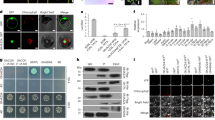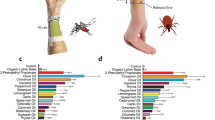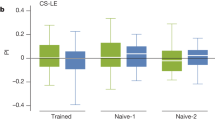Abstract
IN a comprehensive paper on insecticidal resistance in anopheline mosquitoes Davidson1 demonstrated that resistance to dieldrin in Anopheles gambiae is due to a single gene, partially dominant. In this work the discriminating dose technique, supported by Milani2, for genetical studies on insecticidal resistance in insects was utilized.
This is a preview of subscription content, access via your institution
Access options
Subscribe to this journal
Receive 51 print issues and online access
$199.00 per year
only $3.90 per issue
Buy this article
- Purchase on Springer Link
- Instant access to full article PDF
Prices may be subject to local taxes which are calculated during checkout
Similar content being viewed by others
References
Davidson, G., Bull. World Health Org., 18, 579 (1958).
Milani, R., Riv. Parassit., 17, 233 (1956); 18, 43 (1957).
Shanahan, G. J., Nature, 181, 860 (1958).
Author information
Authors and Affiliations
Rights and permissions
About this article
Cite this article
SHANAHAN, G. Genetics of Dieldrin Resistance in Lucilia cuprina Wied.. Nature 183, 1540–1541 (1959). https://doi.org/10.1038/1831540b0
Issue Date:
DOI: https://doi.org/10.1038/1831540b0
This article is cited by
Comments
By submitting a comment you agree to abide by our Terms and Community Guidelines. If you find something abusive or that does not comply with our terms or guidelines please flag it as inappropriate.



